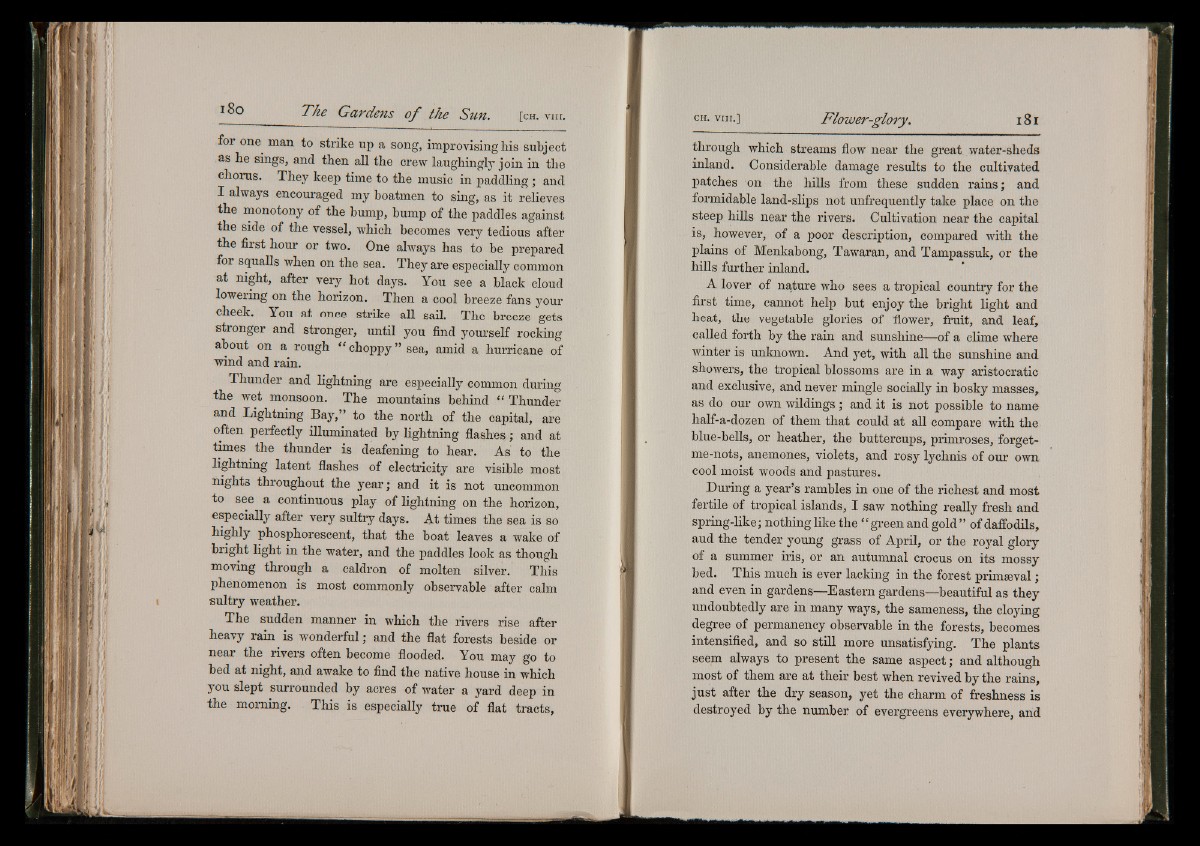
for one man to strike up a song, improvising his subject
as he sings, and then all the crew laughinglj’ join in the
chorus. They keep time to the music in paddling ; and
I always encouraged my boatmen to sing, as it relieves
the monotony of the bump, bump of the paddles against
the side of the vessel, which becomes very tedious after
the first hour or two. One always has to be prepared
for squalls when on the sea. They are especially common
at night, after very hot days. You see a black cloud
lowering on the horizon. Then a cool breeze fans your
cheek. You at once strike all sail. The breeze gets
stronger and stronger, until you find yourself rocking
about on a rough “ choppy” sea, amid a hurricane of
wind and rain.
Thunder and lightning are especially common during
the wet monsoon. The mountains behind “ Thunder
and Lightning Bay,” to the north of the capital, are
often perfectly illuminated by lightning flashes; and at
times the thunder is deafening to hear. As to the
lightning latent flashes of electricity are visible most
nights throughout the year; and it is not uncommon
to see a continuous play of lightning on the horizon,
especially after very sultry days. At times the sea is so
highly phosphorescent, that the boat leaves a wake of
bright light in the water, and the paddles look as though
moving through a caldron of molten silver. This
phenomenon is most commonly observable after calm
sultry weather.
The sudden manner in which the rivers rise after
heavy rain is wonderful; and the flat forests beside or
near the rivers often become flooded. You may go to
bed at night, and awake to find the native house in which
you slept surrounded by acres of water a yard deep in
the morning. This is especially true of flat tracts,
through which streams flow near the great water-sheds
inland. Considerable damage results to the cultivated
patches on the hills from these sudden rains; and
formidable land-slips not unfrequently take place on the
steep hills near the rivers. Cultivation near the capital
is, however, of a poor description, compared with the
plains of Menkabong, Tawaran, and Tampassuk, or the
hills further inland.
A lover of nature who sees a tropical country for the
first time, cannot help but enjoy the bright light and
heat, the vegetable glories of flower, fruit, and leaf,
called forth by the rain and sunshine—of a clime where
winter is unknown. And yet, with all the sunshine and
showers, the tropical blossoms are in a way aristocratic
and exclusive, and never mingle socially in bosky masses,
as do our own wildings; and it is not possible to name
half-a-dozen of them that could at all compare with the
blue-bells, or heather, the buttercups, primroses, forget-
me-nots, anemones, violets, and rosy lychnis of our own
cool moist woods and pastures.
During a year’s rambles in one of the richest and most
fertile of tropical islands, I saw nothing really fresh and
spring-like; nothing like the “ green and gold” of daffodils,
aud the tender young grass of April, or the royal glory
of a summer iris, or an autumnal crocus on its mossy
bed. This much is ever lacking in the forest primaeval;
and even in gardens—Eastern gardens—beautiful as they
undoubtedly are in many ways, the sameness, the cloying
degree of permanency observable in the forests, becomes
intensified, and so still more unsatisfying. The plants
seem always to present the same aspect; and although
most of them are at their best when revived by the rains,
just after the dry season, yet the charm of freshness is
destroyed by the number of evergreens everywhere, and